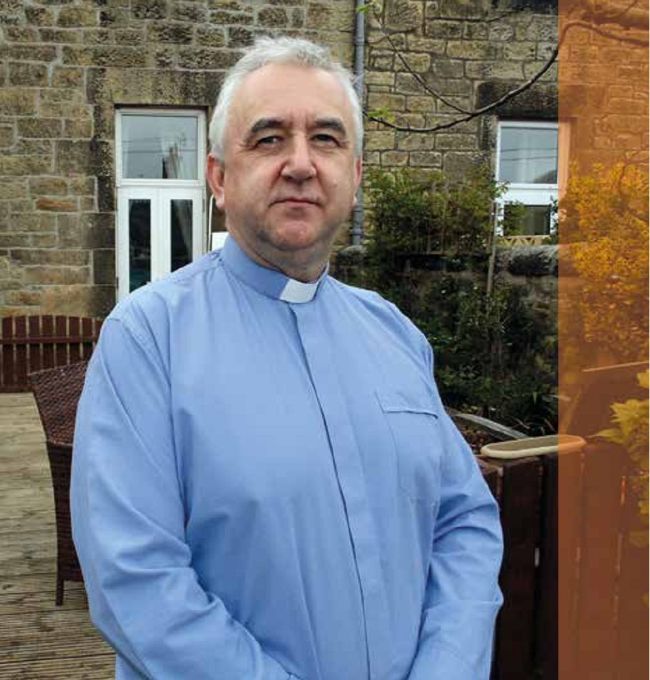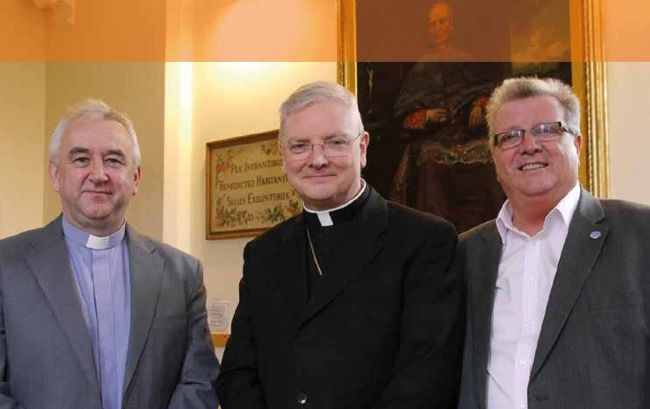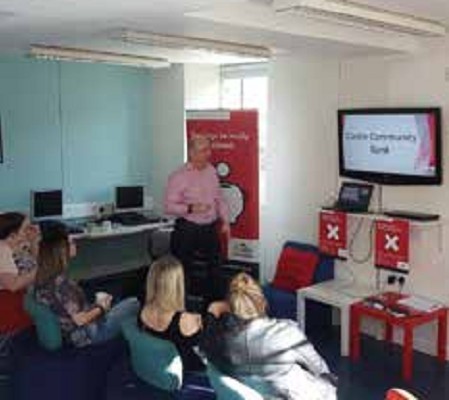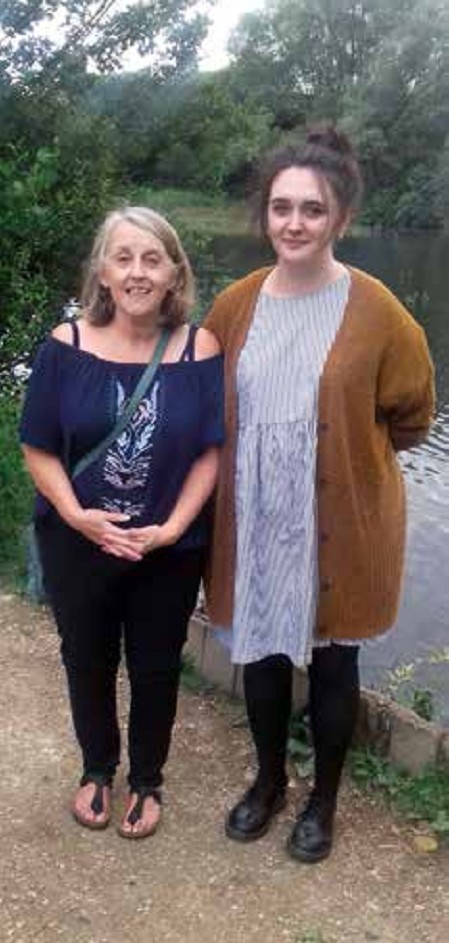‘I sleep very well these nights’
The Rev Iain May tells Jackie Macadam how he made the journey from high-flying banker to Edinburgh minister.
MINISTERS sometimes come into the job from any number of backgrounds and with all kinds of expertise.
But for the Rev Iain May, minister at South Leith church and the business mind behind a small community bank that is challenging the way people think about how and why they save and borrow, that journey has perhaps been more extreme than many.
For many years, Iain was a high flying banker, riding high on the crest of the boom times and the Celtic Tiger economy.
He didn’t start that way though. Born and brought up in Penicuik, in 1977 he went to sea as an officer cadet in the Merchant Navy, staying until 1985.
He says: “By then it was becoming apparent that the British Merchant Navy was on the verge of a collapse and I figured it was time to leave.
“I was married for three months in 1986 but tragically, my wife was killed in a hillwalking accident.
“I felt it was time to complete my education and get a degree so I went to Edinburgh University to study civil engineering and on graduation I reckoned it was probably best to get a job.
“I think I spotted about 30 jobs I fancied, and got some interviews. I was offered a job with American Express in their London head office. I was never a retail banker as I always worked in the head office functions.
“I worked first in the London office and then came back to Edinburgh to look after Amex’s corporate functions up here.
“It was during this time that I met Ann, my wife and our first son, Iain, arrived in 1991 and our daughter, Catherine, in 1994.”
In the meantime he had joined the Royal Bank of Scotland as part of Project Columbus, the restructuring which revived the bank’s fortunes in the early 1990s, working as marketing manager in Edinburgh and then London.
The money was excellent, and Iain says they lived ‘the good life’.
“We had everything we could want but it was one of these situations where it didn’t matter how much you made, you always found ways to spend it.
“Something was beginning to niggle at the back of my mind, but I pushed it aside and was offered a good job with the Allied Irish Bank in Dublin. The pace of life in Dublin was appealing, and we moved the family there in 2000.
“Everything was booming – it was the time of the Celtic Tiger – and we had a lovely home in the Skerries, a coastal village just north of Dublin. However, though things were very good for us, I was really starting to feel a deep and strong sense that things were wrong. Very wrong.
“I began to have doubts. Everything was going well yet the intense sense of greed I found around me in the workplace and in parts of the Irish community, especially in the buy-to-let market made me believe that all this was unsustainable and things had to change. It was all just a bit crazy.
“I had a conversation with Ann because I was worried about how ‘off’ it all felt and how I was having to cope with constant challenges to my personal integrity.
“I felt that my nose was well and truly in the trough.
“I wanted to move back to Edinburgh and raised it with my boss, the Managing Director of AIB. He thought I was going through a ‘mid-life crisis’ – I probably was! – and told me to take the summer off to think things over.
“By December 2005 I’d decided to resign. “I just had a feeling that I needed to ‘repay’ in some way.
“We came back to Edinburgh and rekindled our links with North Leith Church – me and my wife, Ann’s family church. I became an elder there, but I still felt it wasn’t enough. I created a meals on wheels type of business, but I still wasn’t happy. Heaven knows what my family was thinking about me at this stage. All this wealth and still this emptiness inside.
“I also started to work for a local credit union again, thinking this was me paying back with my experience, trying to help those who perhaps did not have the options many of us have in terms of saving and borrowing.”
It was around this time that Iain’s minister, the Rev Ken Baird, suggested that he might like to look in to becoming a minister himself.
“I can safely say that the idea was never on my radar,” Iain says. “However, once the seed had been planted, that feeling inside me seemed to get more and more interested, and finally I agreed to go along to an enquirers conference.

The Rev Iain May
“I listened and I thought but a part of me decided that I wasn’t interested in jumping through all these hoops so around 2006 I dismissed it from my mind.
“When I came back from the conference, I decided that eldership was my best role to serve, as I didn’t think ministry was for me.
“However, Ken suggested otherwise and told me to go away and think about it on the family holiday I was about to take, two weeks in the Slate Isles south of Oban in a caravan. I spent the time there doing a lot of walking and talking with my wife Ann. Somewhere on these walks, I decided to take this feeling – this calling as I was now beginning to realise it was – to the next stage.
“I sat down with my family and explained to them that this was something I felt I needed to pursue. I wasn’t sure how far it would go, but I needed to try.
“They were confused, naturally, but Ann understood and was very supportive. Of course, it would mean big changes to our lifestyle: my beloved yacht, the riding lessons and the foreign holidays would need to go.
“I sold shares to give us a financial cushion to get us through the first year of my university course and my wife, a trained nurse, worked to help support me and the family.
“I was surprised at the variety of people I met during the training – they came from all sorts of backgrounds and there were so many ways to serve the church.
“Everything was going well yet the intense sense of greed I found around me in the workplace and in parts of the Irish community, especially in the buy-to-let market made me believe that all this was unsustainable and things had to change. It was all just a bit crazy.”
“We moved to a flat in Trinity, and especially for my family, my teenage children and my wife, adaptions had to be made. There were challenges but we got through.
“It was particularly hard for Ann over this period, being the main breadwinner, though in the latter years of my degree I was able to do some consultancy work to help cover little extras. It was still a relief when I graduated.
“I guess I forget now how stressful it was for everyone over this time. I remember my daughter didn’t want me to walk her to school because I was a student minister and in the way of young teenagers, she was a bit embarrassed. Mind you, when her friends found out I was a minister they apparently thought that was ‘very cool’ so I was allowed to come to the gates with her!”
After completing his training and probation in 2011, he found out that South Leith was looking for a minister.
“To be honest, it seemed like destiny,” he says. “There were just so many connections. The sea has a strong connection with South Leith, there’s the annual seaman’s service and of course there is the merchant navy memorial there. I was a merchant navy officer so I understood the people and the way of life there. I understood the nature of the congregation.
“I was honoured to be selected to be their minister. The annual Seafarers’ Service and wreath laying ceremony at the Merchant Navy Memorial in November is a very special time for myself and all the community. Last year, 21 seafaring and community groups were represented there. I am filled with a sense of history and pride working with them now.”
But he also began to notice that the area suffered from the effects of poverty. In 2013, the church joined with four others and the Trussell Trust to set up Edinburgh North East Foodbank, but Iain and other local clergy also wanted to help people save and borrow money sustainably.
“Around the time of my arrival in Leith, the local priest came to me with concerns about the number of pay day loan shops that were springing up in Leith.
“The annual Seafarers’ Service and wreath laying ceremony at the Merchant Navy Memorial in November is a very special time for myself and all the community. Last year, 21 seafaring and community groups were represented there. I am filled with a sense of history and pride working with them now.”

Caption will go here
“He felt we needed to do something about it and I agreed with him. I had a banking background so what did I think about setting up a credit union?
“We wanted to do something but I felt it was important to do it the right way, a sustainable way, so that it would truly help those who feel they had no options but use the local high cost lenders and loan shops.
“I gathered some people from the banking industry who were interested in social justice and who had skills that could be used to put something positive into action, and some people from the local community who were interested in being on the board, and we basically decided to set up a credit union, but with a difference. We wanted to call it a ‘community bank’, fully regulated by the Bank of England, based on a credit union model. That would mean we had to take precautions about risk taking, marketing, governance and all the other regulations that are designed to keep the banking industry safe now.
“We knew we needed to appeal to everyone. 80 per cent of the business will come from local people who do have choices and options regarding where they save or borrow, in turn this will allow us to serve and support the 20 per cent of people who do not have such choices or options – those whose income does not allow them to save or borrow from normal institutions and who are in many cases ‘financially exploited’ by the pay day loan shops.
“Two small credit unions in the area were in decline due to lack of expertise, and we merged with them to create Castle Community Bank, which launched in the spring of 2016. We actually needed permission from the Bank of England to use the word ‘bank’ in our title!
“We started with a base of about 500 people, with savings of around £250,000.
“We have a state of the art online presence so that anyone can go on, at any time of the day or night and check their account or do business there. It’s exactly what people would expect from a modern bank, but with the emphasis on ethical banking and sustainability.
“We’re trying to help people develop a better, more sensible relationship with their money”.
“We have a couple of branches and hopefully a couple more opening soon – it’s the ‘clicks and bricks’ model.
“And it’s working. It’s taking off. We have over £1 million in savings and are lending every month, loans that are helping people who would otherwise use the high interest lenders.
“We’re trying to help people develop a better, more sensible relationship with their money.
“I’m the Chair of Castle Community Bank, but in that role, though I have great responsibility, I can’t play an active part in a hands-on capacity anymore. It’s such a novel model that the Bank of England regulators are taking a keen interest. None of the directors are paid – they all donate their skills and knowledge as volunteers.
“Some churches, some of the bigger banks and some interested individuals have helped us raise some working capital and it’s projected that we’ll break even very shortly.
“Community is the key word, as it is available to anyone and their families if they live or work in an EH postcode.
“We’re truly an option for everyone now, and finally I’m getting the feeling that this kind of ‘paying back’ is the right thing to do.
“Put it this way – I sleep very well these nights!”

Castle Community Bank meeting

Iain’s wife Ann and daughter Catherine